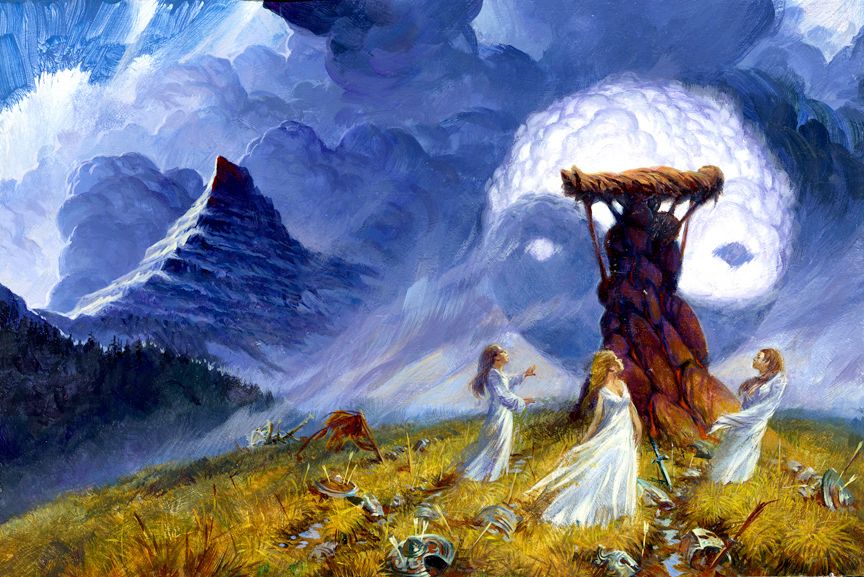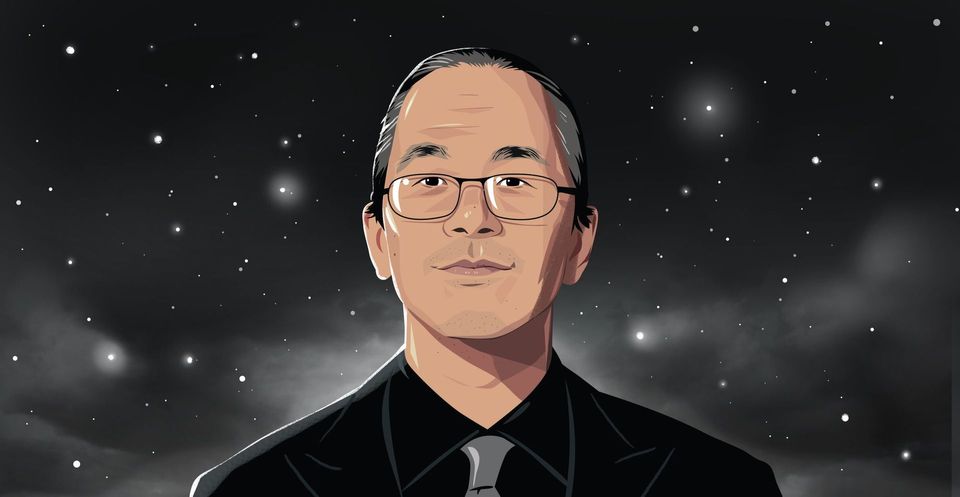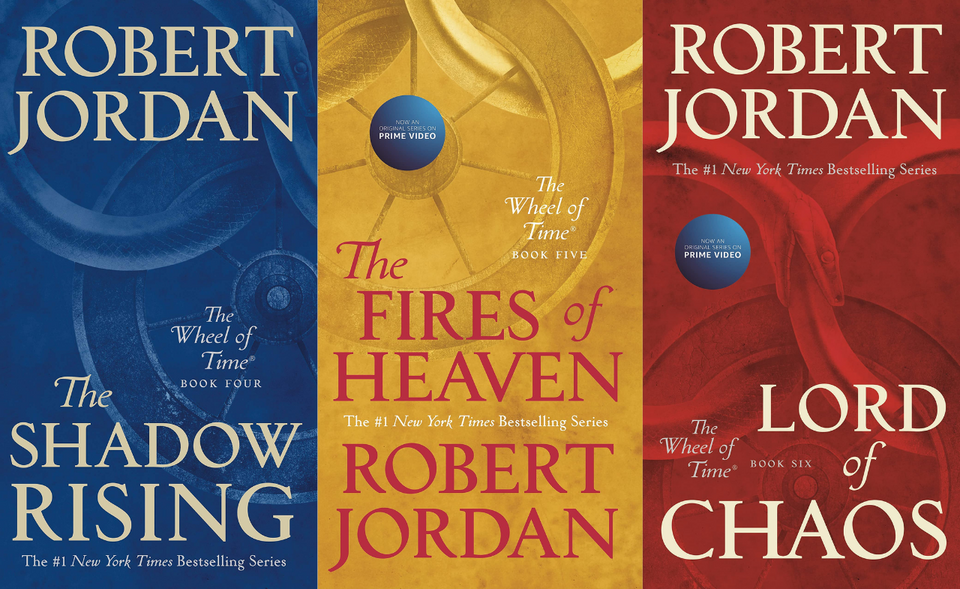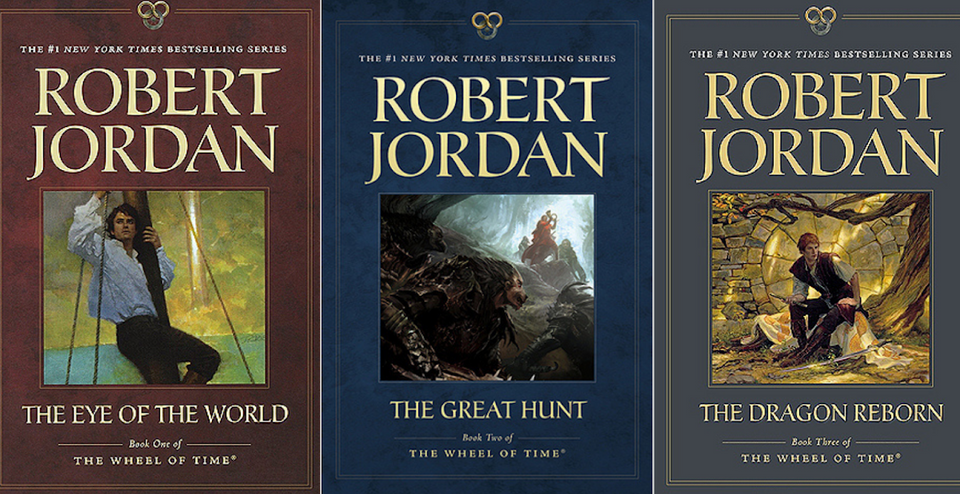Stormlight Archive 1: The Way of Kings
A review and the best moments from this fantasy series opener. Pt 4 of my Sanderson articles.
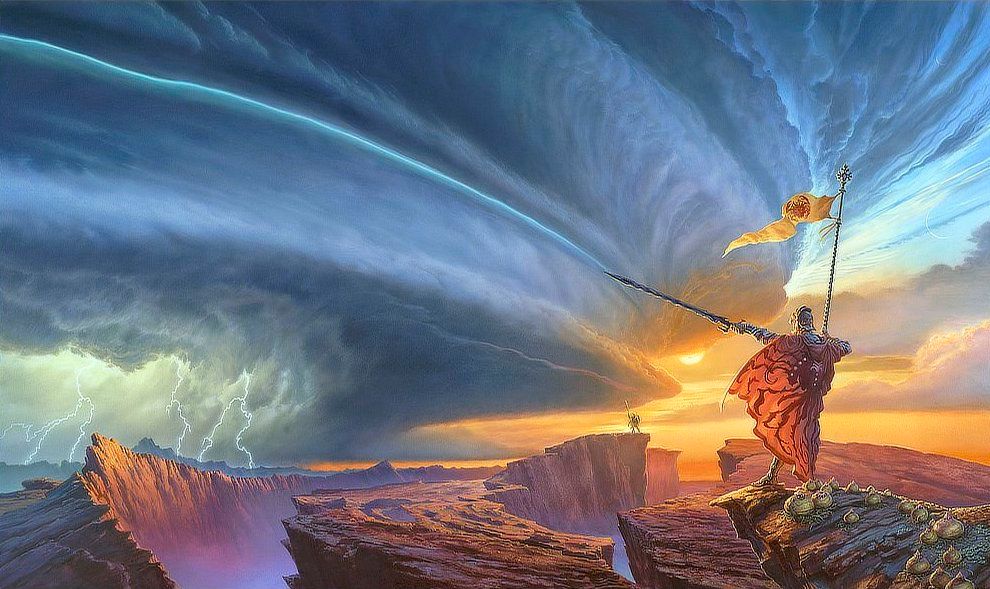
2023 has been called "The Year of Sanderson", due to the author's record-breaking kickstarter capping off a relentless rate of project releases. I have thoroughly enjoyed his other works, but to many readers his Stormlight Archive series is recognised as one of the best modern fantasy works out there. Read on for my review of the first novel, which is as long as the entirety of The Lord of the Rings.
This is pt 4 in my articles tracking and reviewing Brandon Sanderson's works. See all Brandon Sanderson articles with the button below:
#1 The Way of Kings
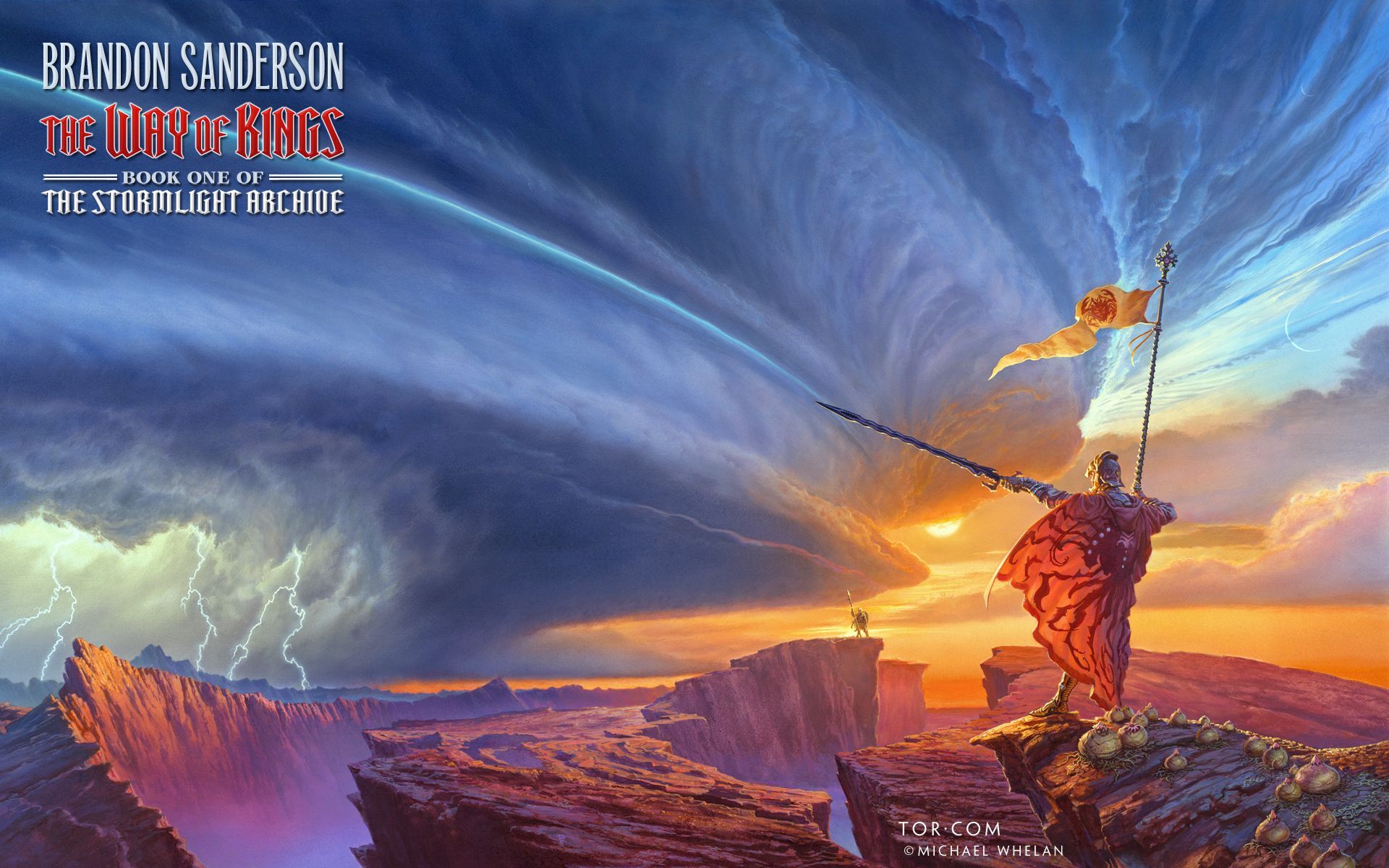
Published: 2010

Read: May 27th, 2023
“Life before Death. Strength before Weakness. Journey before Destination.”
Have I been spoiled by The Wheel of Time and Mistborn? The Way of Kings certainly feels big, with sprawling landscapes and perspectives. However, the world itself felt small - restricted to a few key players, and limited in the knowledge which readers are granted. Initially my rating was a bit lower - I enjoyed the book and it was a comparatively easy read despite the long page length, but I had issues with the worldbuilding and characterisation. However, the longer I've reflected on this novel the more I think it has actually improved in my mind, with moments staying with me long after the book is closed.
I have been waiting years to read the Stormlight Archive, and when hearing all the hype around Sanderson opted to start with Mistborn first (see here). So much happened in every book in that series, particularly in the first trilogy. Comparatively, The Way of Kings acts as much more of an introduction to the weathered world of Roshar and our three (potentially four) leads. It carries Sanderson’s trademark storytelling precision, but the timeline feels much longer here - I feel the true climax is coming books down the line, not necessarily in this novel.

“Does one deserve to have evil done to her by consequence of putting herself where evil can reach her?”
Roshar is certainly an interesting setting, particularly with the highstorms and unique flora and fauna. However, I felt that whatever I learnt only gave me a rudimentary understanding of the world - and that is me assuming that Sanderson will provide more depth and connections between the creatures and story. The same could be said of the characters. I have to commend Sanderson for the range of perspectives we receive as readers. The Interludes are interesting, but it is really the three rotating leads who are meant to show the breadth of the world. A former soldier turned despondent slave, a highprince seeking higher ideals after a violent past, and a young woman experiencing independence whilst attempting to steal a magical artefact.
These three monoliths feel like the perfect balance of interesting worldviews from which to take a reader on a journey, but they just don’t come together here. Of the three leads, this book is owned by Kaladin and he is given the most pagetime. He feels complete, yet the book really is providing an (admittedly emotional) backstory to his class-based struggles and experiences of life and death. Dalinar and moreso Shallan feel like they’re at the beginning of their arcs or journeys. The reader is left with tantalising teases of their past.
On the positive side, following each character’s introspection isn’t a chore. Sanderson’s writing is easy to grasp, and this benefits his action sequences. They are few and far between, but when they come you can’t help but get wrapped up in them as a reader. On the other hand, his passion for hard magic systems is evident, but again readers are only given a glimpse in TWOK. I’m sure as I read the rest of the Stormlight Archives I will better understand the systems and world, and perhaps that is part of the reason why Sanderson’s reading community love to reread this novel.
"The purpose of a storyteller is not to tell you how to think, but to give you questions to think upon. Too often, we forget that."
This likely elucidates my own experience in the weeks since finishing TWOK. Moments from the book have stayed with me, and as time passes I feel myself appreciating them more - to the point of chills. I think that for some of these moments, I wasn't able to fully engage in them when reading - due to me being distracted, or even emotionally closed off from some of the darker stuff. Perhaps it's a result of thinking about these highlights without the "fluff" in-between. Regardless, I pressed straight onwards into the sequel Words of Radiance, and as will be clear from my review in the next Brandon Sanderson article, enjoyed it thoroughly.
Also just as a final note, how cool is the title "The Way of Kings"?! I mean, seriously... 🤩
Favourite Moments (spoilers for TWOK!)
Click on each box to expand its contents
First bridge run
"Drop!"
"Push!"
Die.
Having been through the exhaustion of his bridge-carrying run, physically hurting due to a lack of proper footwear and clothing, I too felt ready to collapse on Kaladin's behalf. But the realisation of where these bridges are going and their purpose in the Shattered Plains was like a bucket of ice water thrown into my face, and I found myself getting caught up in the hellstorm.
Experiencing this moment through the audiobook, with all the background crunching and war horn noises, truly elevated it to a cinematic level for me. This was where I first got serious about The Way of Kings, and found my own heart pulsing alongside Kaladin's as he reached the frontlines of the Parshendi army.
Kaladin at the Honor chasm
"What is one more try, then?” Her voice was soft, yet somehow stronger than the storm. “What could it hurt?”
Kaladin has been through some heavy times. From being Stormblessed in the army, to caged as a slave and then broken by bridge runs. This moment comes only the end of Part One, but is a powerful one with an anti-suicide message. Give life a chance.
Tien's eyes
Governor Roshone's cruelty knows no bounds. Having learnt the truth behind Lirin's spheres with Kaladin, our view of events is slightly adjusted. That doesn't change any of the shock of Tien being conscripted into Amaram's army.
“In four years, I will bring him home safely,” Kaladin said. “I promise it by the storms and the Almighty’s tenth name itself. I will bring him back.”
I promise....
Oddly this sequence reminded me of Katniss volunteering as tribute for Prim from The Hunger Games. I felt the emotion, and it was a gut-wrenching way for Tien's fall to begin. The reader's knowledge of Kaladin's inability to keep this promise, and his youthful optimism here compared to the bleakness we've witnessed throughout the novel, makes this scene truly heartbreaking.
Wit's musical story
Hoid's musical storytelling of Derethil and the Wandersail almost felt out of place in this book. Yet that is exactly why I loved it. Like a complete mini-tale from Tolkien's Silmarillion, Hoid delivers a story that shows this world is indeed far larger than what we have glimpsed in The Way of Kings - and in a few pages of a single chapter spellbindingly captures both Kaladin's and the reader's attention.
Dalinar's speech
Betrayed by Sadeas. Surrounded on The Tower, Parshendi closing in. The remaining members of the Cobalt guard and the rest of his army encircled, fear in the eyes of his men. His reputation as the once ruthless Blackthorn being questioned by his seizure-inducing visions during highstorms. And Dalinar says the following, a true reflection on the in-world text titled The Way of Kings and King Nohadon's teachings.
“Death is the end of all men!” Dalinar bellowed. “What is the measure of him once he is gone? The wealth he accumulated and left for his heirs to squabble over? The glory he obtained, only to be passed on to those who slew him? The lofty positions he held through happenstance?
“No. We fight here because we understand. The end is the same. It is the path that separates men. When we taste that end, we will do so with our heads held high, eyes to the sun.”
He held out a hand, summoning Oathbringer. “I am not ashamed of what I have become,” he shouted, and found it to be true. It felt so strange to be free of guilt. “Other men may debase themselves to destroy me. Let them have their glory. For I will retain mine!”
The Shardblade formed, dropping into his hand.
Genuinely chill-inducing and perfectly timed with the shardblade's apparition. Perhaps my favourite moment from the book.
Kaladin goes back
Kaladin's paternal backstory hits with full force as his father's words echo in his mind. Despite me seeing this kind of turnaround coming from miles away, the moment was still powerful.
“Somebody has to start, son. Somebody has to step forward and do what is right, because it is right. If nobody starts, then others cannot follow."
What was even more powerful was Kaladin's uttering of the Second Ideal of the Knights Radiant. His shield had attracted all the Parshendi arrows. The reader has seen the flashback to Tien's death, Kaladin cradling his body. Then as he returns to the present, he has a renewed sense of understanding and purpose. Nearly exhausted of light, he runs across a half-pushed bridge, and leaps the remaining chasm towards the Parshendi - whose beards are woven with gems of charged Stormlight. In a slow-motion moment of bright brilliance, he absorbs the light, lands with a smile and whispers the Second Ideal:
“I will protect those who cannot protect themselves.”
Dalinar's trade
A whole book building up the value of these shardblades, their superiority to other weapons on a battlefield and their ability to easily take lives. Combine that with Kaladin's hatred of lighteyes and the Alethi's classist societal structure. In this single moment, Dalinar shows he is a truly honourable man.
“What is a man’s life worth?” Dalinar asked softly.
“The slavemasters say one is worth about two emerald broams,” Kaladin said, frowning.
“And what do you say?”
“A life is priceless,” he said immediately, quoting his father.
Dalinar smiled, wrinkle lines extending from the corners of his eyes. “Coincidentally, that is the exact value of a Shardblade. So today, you and your men sacrificed to buy me twenty-six hundred priceless lives. And all I had to repay you with was a single priceless sword. I call that a bargain.”
“You really think it was a good trade, don’t you?” Kaladin said, amazed.
Dalinar smiled in a way that seemed strikingly paternal. “For my honor? Unquestionably.”
Shallan's past
“Tell me. Tell me. What are you?”
“What am I?” Shallan whispered. “Truthfully?” It was a day of confirmation. She felt strangely strong, steady. Time to speak it. “I’m a murderer. I killed my father.”
The whole book we are given hints of Shallan's past, and towards the final Part there are hints that she possibly has a shardblade. With the truth of her father's death emerging in the climax, I found myself floored. She is no longer confined to a bed and melancholy, and without a doubt I was left excited to read more of her story in the sequel.
The Identity of the Voidbringers
“We didn’t destroy the Voidbringers...We enslaved them.”
Despite the amount of cultures being thrown at readers in the book's Interludes and from some of the Bridge Four crew, details are sparing. One of these such nuances is those helpful Parshmen who have been baked into Alethi society at every level. They constantly assist Jasnah and Shallan in the Palanaeum, but were almost a forgotten detail for me about this society compared to all the lighteye/ darkeye classism.
Sanderson pulls a smart reveal yet again to finish the novel.
Related Tags
📖 Thank you for reading the article!
📚 As always, you can find more book reviews on my Goodreads account here 😃

